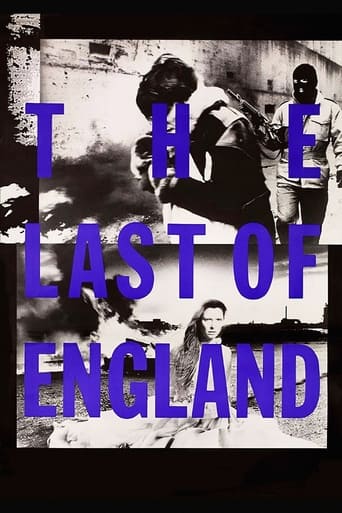Richard Burin
"On a green hill, mourners stand and weep for the last of England," intones Nigel Terry at the start of this arresting mission statement from art-house infant* terrible Jarman. The film is a barrage of striking imagery, mixing old Super 8 footage of a child playing in the back garden with shots of a teenage punk shooting up in a garage, and the middle-aged Jarman, apparently chronicling vanishing species of plant in some kind of futuristic warehouse. Then there's clips from news reports, audio of Hitler, some staged stuff about paramilitaries and - of course - a naked yuppie having sex with a soldier on a massive Union Jack. An air of paralysing despair permeates this one-of-a-kind movie, which takes on state-sponsored violence, the Thatcher government, misguided building projects, the trashing of the environment and American cultural imperialism - all in the opening half hour. Not all of it hits the target, and some of it may only make sense to Jarman, but for every piece of self-mythologising pretentiousness there's a pithily employed phrase (courtesy of T.S. Eliot or Allen Ginsberg) or thought-provoking juxtaposition. Like the sounds of a Nazi rally segueing into a vicious sideswipe at military discipline, then military pageantry. Or widow Tilda Swinton ripping her wedding dress to shreds - even as she wears it - on a nuclear beach. The Last of England plays like the forlorn, obscene illegitimate child of Humphrey Jennings' hymn to the nation - Listen to Britain. I liked it. Great soundtrack too, put together by Simon Fisher-Turner, and containing Elgar, Marianne Faithful and a spot-on pastiche of '30s musical numbers called Broadway Boy.*Yeah, I know this should have an 'e'. IMDb isn't so sure.
neilrolland
Challenging the politics of 80s Britain and the film-making of the time, The Last of England stands out as an outstanding cinematic achievement.Don't get me wrong, when I first watched, I found it difficult to watch and actually left before it finished! But it drew me back. I did some reading on the film and on Derek Jarman and after this I was able to see the Genius in the piece.The main character is Spring. (we do not learn this is his name until the end credits) He portrays the working class outsider in Thatcher's Britain. There are scenes of destruction, the end of industry, the feeling of terror brought on by the IRA at the time. The film challenges the Taboo's of homosexual relationships, forbidden love, drug use etc etc Through montage, still images, music and voice over, Jarman portrays his feelings of Britain in the 1980s and how he would like to sail away from this terrible Island (see the final sequence) Shot on 8mm, Jarman was revolting against the Hollywood standard 35mm, using home video footage on top to garnish the effect.Really before you see this film, you MUST do some reading into it first. I believe this will enhance your enjoyment and let you get a flavour of what Jarman was trying to do with this piece
LaFeeChartreuse
Reading the comments on this film or others like it is a frustrating experience, because so many people don't seem to be clear on the concept. Let me put it very simply:This. Is. Not. A. Narrative. Film.If you're going to complain about lack of a plot, character development, or other features of narrative films, don't go see a non-narrative film! It's an entirely different experience, and that's the whole idea. Judging an experimental montage of images and music and voice by the standards of a conventional narrative film is ridiculous -- like complaining about a drama because it wasn't funny. It's not SUPPOSED to be. If you don't like films that don't have a conventional narrative, don't see them.So, for those who DO actually like experimental, non-narrative film, I'd highly recommend this one -- it's one of my all-time favourite films of any sort, even though know the majority of the population probably couldn't sit through it. I found it incredibly powerful, evocative and visually stunning, and even 15 years after seeing it, some images from it are still burned into my mind. I'm a big fan of Jarman's work in general, but if I had to pin down one single favourite from his work, I think this would be it.
slawman
"The Last of England" was the second Derek Jarman film I saw (after "Edward II"). It still amazes me how a film that is so cold in feel and structure (not to mention image) can be so emotionally moving and draining. This was Jarman's peculiar gift, and he employs it here perhaps better than anywhere else (although "Blue" comes close - but that's a completely different experience). If you're looking for introductions to Jarman, you should probably be advised to look elsewhere - this is not easy going for the novice - but as a treatise on the emotional, spiritual, and physical fragmentation of modern society (in this case England, but it really could be anywhere), this film is one of the very best. No linear plotline, only one recognizable recurring character, but somehow one feels that Jarman has channeled all of his worries, fears, and frustrations directly into your cranium. Needless to say, not for everyone - but you already knew that, right?



